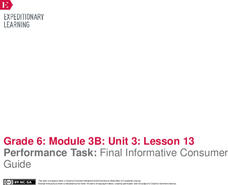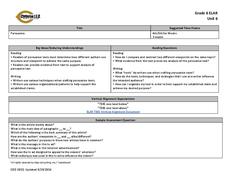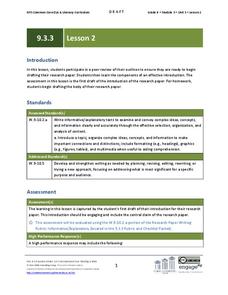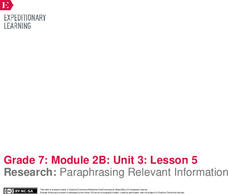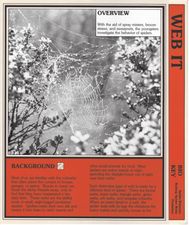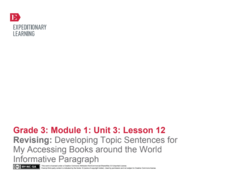Curated OER
Who Knows? Your Privacy in the Information Age
Teach young adults how to become advocates for their privacy in the modern information age. In a series of five lessons, learners explore their beliefs and opinions about privacy vs. the actual laws regarding who has the right to access...
EngageNY
Performance Task: Final Informative Consumer Guide
Formative feedback should be kind, specific, and helpful. Pupils engage in a peer editing process, using a rubric to critique a partner's writing. Next, scholars use the feedback to create the final version of their informative consumer...
Cleburne Independent School District
Grade 6 English Language Arts and Readiness: Persuasive
What is the best way to compare and contrast viewpoints on the same topic? A persuasive writing unit plan addresses targeted skills, vocabulary, instructional strategies, and suggested resources that would be perfect for developing writers.
EngageNY
Writing an Argument Essay: Planning the Essay
Preparation is the key to success. With the help of an informative resource, scholars complete a writing improvement tracker to identify their writing strengths and challenges. They also meet with partners to plan an argumentative essay...
EngageNY
Writing an Argument Essay: Gathering Evidence
Writers work on a plan for their argumentative essays using a Pygmalion Essay Planner to help develop a claim and counterclaim for their essays. They determine what information from the Eliza Character Tracker to incorporate and write it...
EngageNY
Grade 9 ELA Module 3, Unit 3, Lesson 2
After a peer review of their outlines, class members examine a model of an effective, engaging introduction and then craft the first draft of the introduction to their research paper.
EngageNY
Grade 9 ELA Module 3, Unit 3, Lesson 3
Plagiarism is the theft of intellectual property. To avoid this crime, class members learn how to create a works cited page and how to craft in-text citations. After examining a high-performance model paragraph and an example of a works...
EngageNY
Research: Paraphrasing Relevant Information
Young writers practice paraphrasing information from Truth in Advertising? They keep an eye out for examples of false advertising as they read, recording ideas and information in their researcher's notebook along the way.
EngageNY
Writing: Analyzing the Conclusion of “The Golden Key” and Drafting a Compelling Conclusion for the Hero’s Journey Narrative
There's something different here. Using a note-catcher, scholars determine the differences between the conclusion of a piece of analytical writing and the conclusion of a narrative. Next, they begin drafting their own narrative...
EngageNY
Organizing Evidence and Writing an Opinion Paragraph: The Importance of Sports in American Society, Part II
Batter up! Using the resource, pupils continue reading an informational article about sports in America and identify evidence that supports the author's opinion. Scholars then write an opinion paragraph about sports.
EngageNY
Informational Essay Planning: Studying the Essay Prompt and Gathering Evidence
Using a Gathering Evidence note-catcher, readers record evidence in A Mighty Long Way and Little Rock Girl 1957. They then use the evidence to analyze and discuss different mediums with their peers. Lastly, they look at a writing prompt...
EngageNY
Finding Relevant Information and Asking Research Questions: The Big Thirst
Let's get to the gist. As scholars continue their study of Charles Fishman's The Big Thirst, they practice writing the gist of the text. Additionally, pupils add notes about the industrial uses of water to their researcher's notebooks.
Curated OER
Web It!
Looking for a way to bring prewriting into your informative writing unit? Use this lesson to reinforce writing skills in your eighth grade language arts class. Young writers use a web graphic organizer as a prewriting tool for expository...
EngageNY
Revising: Strong Conclusions for My Accessing Books Around the World Informative Paragraph
It's important that writers leave their readers with a strong and satisfying conclusion. Help your young writers develop the skills to compose a concluding sentence with the steps outlined here. After class members have had a chance to...
EngageNY
Revising: Developing Topic Sentences for My Accessing Books Around the World Informative Paragraph
Revision is an important part of the writing process. Focus on revising topic sentences and details with the plan described here. This is part of a unit, so pupils have already filled out a graphic organizer about traveling libraries...
Houghton Mifflin Harcourt
Elaboration, Revision, and Proofreading
Designed to help writers strengthen their elaboration, revision, and proofreading skills, this 48-page workbook is packed with information about and exercises in personal, narrative, persuasive, and report writing.
Curated OER
What Makes Our Community Special?
Explore websites, complete research, and use technological tools to create a final multimedia presentation on what makes a community special. Learners of all ages work with a partner to research an interesting aspect of their community,...
EngageNY
Analyzing Evidence: Writing about Theme
Class members prepare for the end-of-unit assessment by analyzing a writing prompt. They complete a Being Made Invisible anchor chart and write their thoughts about captives and invisibility on sticky notes. In addition, they discuss...
EngageNY
Grade 9 ELA Module 3, Unit 1, Lesson 8
Have you ever wanted to learn more about a subject after you finished a great book? Guide ninth graders through an inquiry-based research project as they finish the first chapter of Temple Grandin's Animals in Translation. Having...
EngageNY
Grade 11 ELA Module 2: Unit 2, Lesson 12
Why is it important to make connections across texts? Scholars discover the answer with instructional activity 12 of 14 from the Grade 11 ELA Module 2: Unit 2 series. Pupils analyze the development of ideas in three nonfiction texts,...
EngageNY
Inferring Author’s Opinions and Writing Opinion Statements: Journalists’ Opinions about Segregation Post–World War II (Promises to Keep, Pages 22–25)
Let's play ball! Scholars summarize information from Promises to Keep about segregation in professional baseball after World War II. They then listen as the teacher reads pages 22-25 aloud. Pupils write the gist in their journals of the...
EngageNY
Grade 9 ELA Module 2, Unit 3, Lesson 3
"We need forgiveness and someone to blame." True? Class members continue their analysis of the central claims in Walter Mosley's essay and the support he offers for these claims about people's fascination with crime.
EngageNY
Grade 11 ELA Module 2: Unit 2, Lesson 9
How do authors employ specific word choices to describe complex relationships? Scholars read and analyze the first stanza from Audre Lorde's contemporary poem "From the House of Yemanjá." Pupils determine the meanings of figurative and...
EngageNY
Grade 10 ELA Module 3: Unit 3, Lesson 7
What's your style? Writers examine wording to add formal style and objective tone to their argumentative papers. After looking at examples of sentences, learners use turn and talk to discuss which sentences have a formal style before...



